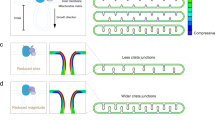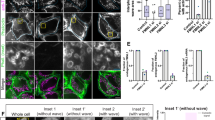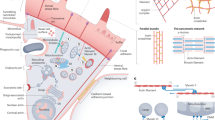Abstract
An association between mitochondria and microtubules has been suggested from microscopic studies1,2 and by the cellular redistribution of mitochondria that is induced by colcemid, which disrupts microtubules1. Intermediate filaments have also been proposed to interact with mitochondria1. To investigate this association further, we have now studied the effect on the cytoskeleton of impairment of mitochondrial functions induced by three metabolic inhibitors: sodium azide, which inhibits electron transport; oligomycin, which inhibits ATP synthetase; and carbonylcyanide p-trifluoromethoxyphenylhydrazone (FCCP), a proton ionophore which uncouples electron transport from ATP synthesis. We have found that treatment of cells with FCCP leads to a disruption of microtubules and an aggregation of vimentin filaments. This effect is not provoked by mitochondrial ATP depletion, but could be linked to another event related to the rapid dissipation of the mitochondrial electrochemical gradient.
This is a preview of subscription content, access via your institution
Access options
Subscribe to this journal
Receive 51 print issues and online access
$199.00 per year
only $3.90 per issue
Buy this article
- Purchase on Springer Link
- Instant access to full article PDF
Prices may be subject to local taxes which are calculated during checkout
Similar content being viewed by others
References
Heggeness, M. H., Simon, M. & Singer, J. Proc. natn. Acad. Sci. U.S.A. 75, 3863–3866 (1978).
Smith, D. S., Jarlfors, U. & Cayer, M. L. J. Cell Sci. 27, 255–272 (1977).
Johnson, L. V., Walsh, M. L., Bockus, B. J. & Chen, L. B. J. Cell Biol. 88, 526–535 (1981).
Hoebeke, J., Van Nigen, G. & De Brabander, M. Biochem. biophys. Res. Commun. 69, 319–324 (1976).
Virtanen, I., Lehto, V. P., Lehtonen, E. & Bradley, R. A. Eur. J. Cell Biol. 23, 80–84 (1980).
De Brabander, M., Geuens, G., Nuydens, R., Willebrords, R. & De Mey, J. Cold Spring Harb. Lab. Conf. on Forms of Microtubule Organization in Cells, May (1980).
Frankel, F. R. Proc. natn. Acad. Sci. U.S.A. 73, 2798–2802 (1976).
Bershadsky, A. D. & Gelfand, V. I. Proc. natn. Acad. Sci. U.S.A. 78, 3610–3613 (1981).
Regula, C. S., Pfeiffer, J. R. & Berlin, R. D. J. Cell Biol. 89, 45–53 (1981).
Nicholls, D. G. & Brand, M. Biochem. J. 188, 113–118 (1980).
Schliwa, M., Euteneuer, U., Bulinski, J. C. & Izant, J. G. Proc. natn. Acad. Sci. U.S.A. 78, 1037–1041 (1981).
Goldman, R. D., Zackroff, R. V., Starger, J. M. & Whitman, M. J. Cell Biol. 83, 343a (1979).
Maro, B. & Bornens, M. Biol. Cell. 39, 287–290 (1980).
Author information
Authors and Affiliations
Rights and permissions
About this article
Cite this article
Maro, B., Bornens, M. Reorganization of HeLa cell cytoskeleton induced by an uncoupler of oxidative phosphorylation. Nature 295, 334–336 (1982). https://doi.org/10.1038/295334a0
Received:
Accepted:
Issue Date:
DOI: https://doi.org/10.1038/295334a0
This article is cited by
-
Compromised mitochondrial function results in dephosphorylation of tau through a calcium-dependent process in rat brain cerebral cortical slices
Neurochemical Research (1994)
-
Participation of the mitochondrial genome in the differentiation of neuroblastoma cells
In Vitro Cellular & Developmental Biology - Animal (1992)
Comments
By submitting a comment you agree to abide by our Terms and Community Guidelines. If you find something abusive or that does not comply with our terms or guidelines please flag it as inappropriate.



